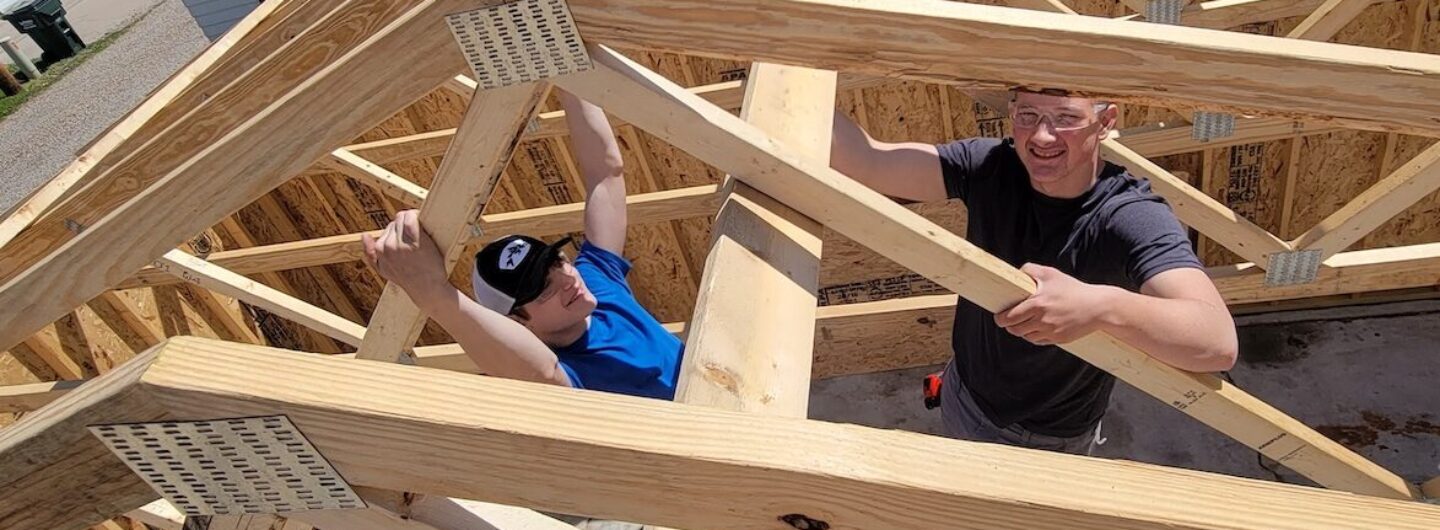The Construction pathway offers students a hands-on education in various aspects of trades, including home maintenance, electricity, masonry, and carpentry.
This pathway is designed to provide students with practical skills and knowledge essential for a career in the construction industry. Through a series of progressive courses, students gain experience in residential construction, learn about industry standards, and develop the skills needed for high-demand careers.
Students who complete the Construction pathway are well-equipped with the skills and knowledge necessary for successful careers in the construction industry. They gain hands-on experience in various aspects of residential construction, learn to work as part of a team, and develop an understanding of industry standards and safety practices.
Whether students choose to pursue further education or enter the workforce immediately, the Construction pathway provides a solid foundation for a wide range of career opportunities in construction.
Construction Pathway at a Glance
Construction Courses
Home Maintenance, Residential Electricity, Concrete & Masonry, Carpentry 1, Carpentry 2, and Carpentry 3
Other Suggested Courses
Computer Aided Drafting, Woodworking I & II, Cabinet Making/Production, Introduction to Manufacturing, Introduction to Welding, Introduction to Business
Check out the Program of Studies for a complete list of course offerings and descriptions.
National Workforce Statistics for Carpenters
| 2020 U.S. median pay | $49,520 per year or $23.81 per hour |
| No. of U.S. jobs in 2020 | 942,900 |
| Projected # of carpenters needed each year | 20,100 |
Southeast Iowa Workforce Statistics
| Carpenter wage | $19.65-$21.06 per hour |
| Openings | 45 per year |
Construction Pathway Course Descriptions
Home Maintenance
This introductory course covers essential home maintenance skills, including electric wiring, plumbing, drywall, painting, and general home upkeep. Students will also gain insight into careers in the construction industry. No prior experience is required.
Residential Electricity
Students are introduced to the basics of residential electricity, including tools, materials, techniques, and codes. This course builds on foundational skills learned in Home Maintenance, preparing students for more advanced electrical work. Prerequisite: Home Maintenance or Instructor Approval.
Concrete and Masonry
This course introduces students to the tools, skills, and techniques used in working with concrete and brick/mortar. It provides a solid foundation for those interested in masonry within the construction industry. Prerequisite: Home Maintenance or Instructor Approval.
Carpentry 1
Focused on using common construction tools, this course builds on the basic skills learned in Home Maintenance and Repair. Students will learn basic framing, roofing, siding, shingles, and window installation techniques. Prerequisite: Home Maintenance or Instructor Approval.
Carpentry 2
Designed as a pre-apprenticeship program, this course teaches the basics of residential construction, emphasizing teamwork and practical application. Students will remodel an existing structure, earning OSHA 10-Hour certification for job site safety. This course spans 2-3 trimesters and awards SCC credits. Prerequisite: Carpentry 1 and CAD 1.
Carpentry 3
Building on the skills from Carpentry 2, students will work as a team to construct a home from foundation to completion. The course emphasizes energy efficiency, sustainability, and environmentally friendly practices, advancing students from proficient to mastery level. This course spans 1-3 trimesters and awards SCC credits. Prerequisite: Carpentry 2.
Woodworking I
This beginner woodworking class is designed for students with little to no woodworking experience. Major activities include learning basic woodworking skills and completing two individual projects. Emphasis is placed on the safe use of woodworking equipment and tools.
Woodworking II
An advanced course focusing on problem-solving in machine woodworking. Students will design, plan, and construct various projects, learning to use woodworking equipment safely. Prerequisite: Woodworking I and one trimester of CAD I or IED, with a minimum grade of C-.
Other Suggested Courses
Cabinet Making / Production
This course aims to improve woodworking students’ skills to mastery level. Students will work on teacher-approved individual projects, refining their techniques and craftsmanship. Prerequisite: Woodworking I and II.
Computer-Aided Drafting I (CAD I)
An introductory course to Computer-Aided Drafting (CAD) fundamentals in 2D and 3D. Recommended for all freshmen and students interested in advanced Industrial Technology classes. Completing CAD I, II, and III grants 3 SCC credits for CAD-101. Prerequisite for all advanced manufacturing and industrial technology classes.
Introduction to Manufacturing (Formerly Metals I)
Students learn basic measurement, planning, and layout skills relevant to metalworking. They will create castings, form sheet metal into a tool box, and operate a machine lathe. This course is recommended for students interested in metalworking, machining, welding, or manufacturing fields.
Introduction to Welding
Students are introduced to the properties, uses, and applications of various metals. The course provides basic welding skills, including oxyacetylene welding and cutting, shielded metal arc welding (ARC), gas metal arc welding (MIG), and plasma cutting. Prerequisite: None.
Introduction to Business
This course provides an understanding of the role of business in the economic system, covering business ownership, organization, new technologies, and current trends. Topics include insurance, credit, and career planning. This practical course is beneficial for any student interested in business.



